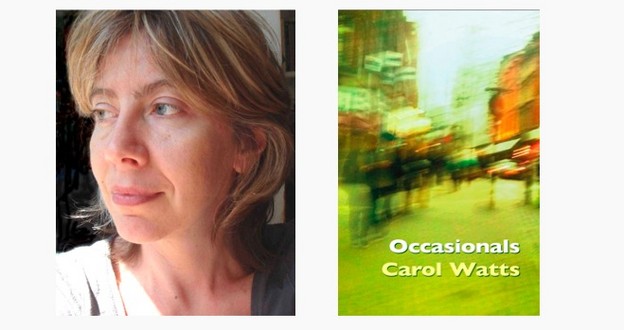Architecture rings true
A review of Carol Watts's 'Occasionals'

Occasionals
Occasionals
When the occasion arises, or for a particular occasion, or perhaps once in a while, or in the case of Carol Watts’s Occasionals, poems written from September 2006 until September 2007, or not poems but a poem in rigorously regular “cuts,” sixty-eight altogether, divided into four equal segments: “autumncuts,” “wintercuts,” “springcuts,” and “summercuts.”
The opening cut/poem begins with the largest durational sentence:
So sit down with your green tea
as if this was your last day, leave
the ledgers unfinished and overdue,
and tell me what you take with you,
now, the sounds of instruments ringing
on pavements, a crow mulling over
trails of aeroplanes, everyone out
in the town, and sirens going. (“autumncuts” I)
The lines invoke Ezra Pound’s “And then went down to the ship,” but instead of setting keel to adventure on the sea, we are home, domestic, with “green tea” and “ledgers unfinished.” We are in a writer’s mind highly cognizant of the natural world, where “spiders hang / in mating season” and “Hydrangeas shoot pale green flowers.” Indeed the specific things in the occasional world are a part of the great delight a reader experiences in the poem. Specific, even in this first poem, in evocation of domestic, economic, personal, urban, aeronautic, and noisy domains. Yet all the things that invoke such a world are, as well, “words.”
waiting for
replacement, by someone else, words.
Once into the poem, into its words and world, one finds not a simple definition or inhabitation of domestic and natural spaces, but a linguistic experience, akin to a Language poetry environment, except articulating not quite what one might expect of a language poem as, while the reality of the depicted world is constrained, it is also fully constructed and present, or at least its presence is fully indicated, fully gestured. And, as any painter knows, gesture carries a world of meaning.
Consider a passage from “springcuts” IV:
Memories, the warmth on green feathers
spreads, the cries. Of distant. Calling,
screeing of swifts, piling over. Sycamores,
so many green bunches of keys, floating.
Might unlock depth, is it now. That seasons
give way to density, will they. Flow,
as they did once. On another scale,
dropping. Wax, the way it cools, skin.
Rucking into something monumental later.
Divided by periods and commas, the representation of the real and of ideas remains fairly close to complete. The real is thus presented as something constructed, yet construction itself is called into question, and the markers we call punctuation also function simply as timing devices. Flow, that which we think of as continuous, stops and starts again. But not quite. “Of distant. Calling.” works as impediment to flow, yet also shows the partialness involved in memory. The whole and the fragment (the partial). Both are here. It is as though Watts has taken, from Louis Zukofsky, both “the” and “A,” and given us “this.” As the next cut, “springcuts” V has it, “In the nature of this.” The natural has a thisness about it, becomes a sign, lifted up.
Perhaps I am presenting Watts’s work as a philosophical idea, or even a demonstration of a poetic. And, while it might be that, it also contains the personal, which comes through in glimpses, inferences, double entendres.
You think you have it.
Taped, then it returns and you see. Your
self, approaching. Unconscious, a deer
in the undergrowth, or embarrassed at.
Meeting, didn’t you just come by the other.
Other way, she might say, you. Answer, yes.
Are you caught out by each. But time goes,
it does not unpick from. Skin is older,
ready to crepe up behind you. (“springcuts” VIII)
There occurs an urgent, sometimes joyous, sometimes startling physicality in Occasionals, with “cells bursting out of” (“springcuts” X), “vital heaving in city bodies” (“springcuts” XV). Yet if there occurs intense eroticism, it signals not just a personal experience, but the world as erotic embrace, as when “birds adapt, raid / brief tongue incursions. Sheltering, from. / Battery, then they dart in open. Dares, / how many. Sound, bound, soar more.” The erotic is, in this instance, a matter of language as well, so that, while the “tongue incursions” seem obvious, the climactic release powers through in “Sound, bound, soar more,” a culmination of openness and escape, linguistically speaking as well as literally soaring.
Toward the end of Occasionals Watts writes, “Life signs. It will be mayhem” (“summercuts” XVI). Rich life, in all its clarity, and all its messiness. Yet though rich and fulfilling, one always desires more. Fulfillment is momentary.
The way dancing spreads your
shoulders, is never enough. (“summercuts” XVII)
Finally, no matter the thisness of the world, there is an implication of something else. The poem ends,
Steam rises from the cup. Tell me who is.
Here, now. This. When my sheet is full.
Here and now, but when? Where? This, but what? “My sheet” is my list of duties, but also the cover to my bed, and a metaphor for my life.
I have seldom read a poetry so exact, yet so longing, expressive of what just might be, somewhere. So abundant, yet with such awareness of our partialness. A poetry that makes of its sentences an architecture that invokes, at the same time, brokenness and clarity. Robert Duncan writes, in “Apprehensions”:
THE DIRECTIVE
is a building. The architecture of the sentence
allows
personal details, portals
reverent and enchanting
construction from what lies at hand
to stand
for what rings true.
Occasionals rings true. Truth is beauty, or truth is an architecture of beauty.